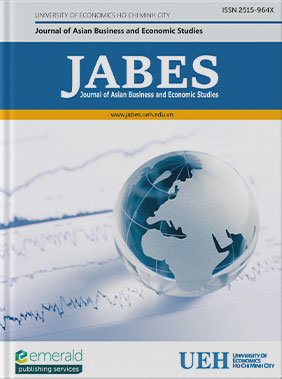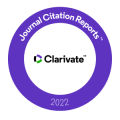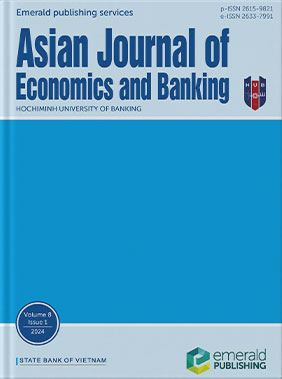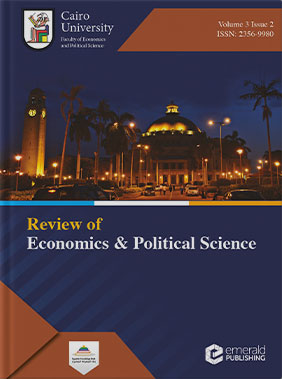
You can publish an open access article in this platinum partnership journal. Authors in this journal are not required to pay an article processing charge (APC)
Journal of Asian Business and Economic Studies
Before you start
For queries relating to the status of your paper pre decision, please contact the Editor or Journal Editorial Office. For queries post acceptance, please contact the Supplier Project Manager. These details can be found in the Editorial Team section.
Author responsibilities
Our goal is to provide you with a professional and courteous experience at each stage of the review and publication process. There are also some responsibilities that sit with you as the author. Our expectation is that you will:
- Respond swiftly to any queries during the publication process.
- Be accountable for all aspects of your work. This includes investigating and resolving any questions about accuracy or research integrity
- Treat communications between you and the journal editor as confidential until an editorial decision has been made.
- Read about our research ethics for authorship. These state that you must:
- Include anyone who has made a substantial and meaningful contribution to the submission (anyone else involved in the paper should be listed in the acknowledgements).
- Exclude anyone who hasn’t contributed to the paper, or who has chosen not to be associated with the research.
- In accordance with COPE’s position statement on AI tools, Large Language Models cannot be credited with authorship as they are incapable of conceptualising a research design without human direction and cannot be accountable for the integrity, originality, and validity of the published work.
- If your article involves human participants, you must ensure you have considered whether or not you require ethical approval for your research, and include this information as part of your submission. Find out more about informed consent.
Research and publishing ethics
Our editors and employees work hard to ensure the content we publish is ethically sound. To help us achieve that goal, we closely follow the advice laid out in the guidelines and flowcharts on the COPE (Committee on Publication Ethics) website.
We have also developed our research and publishing ethics guidelines. If you haven’t already read these, we urge you to do so – they will help you avoid the most common publishing ethics issues.
A few key points:
- Any manuscript you submit to this journal should be original. That means it should not have been published before in its current, or similar, form. Exceptions to this rule are outlined in our pre-print and conference paper policies. If any substantial element of your paper has been previously published, you need to declare this to the journal editor upon submission. Please note, the journal editor may use Crossref Similarity Check to check on the originality of submissions received. This service compares submissions against a database of 49 million works from 800 scholarly publishers.
- Your work should not have been submitted elsewhere and should not be under consideration by any other publication.
- If you have a conflict of interest, you must declare it upon submission; this allows the editor to decide how they would like to proceed. Read about conflict of interest in our research and publishing ethics guidelines.
- By submitting your work to Emerald, you are guaranteeing that the work is not in infringement of any existing copyright.
Third party copyright permissions
Prior to article submission, you need to ensure you’ve applied for, and received, written permission to use any material in your manuscript that has been created by a third party. Please note, we are unable to publish any article that still has permissions pending. The rights we require are:
- Non-exclusive rights to reproduce the material in the article or book chapter.
- Print and electronic rights.
- Worldwide English-language rights.
- To use the material for the life of the work. That means there should be no time restrictions on its re-use e.g. a one-year licence.
We are a member of the International Association of Scientific, Technical, and Medical Publishers (STM) and participate in the STM permissions guidelines, a reciprocal free exchange of material with other STM publishers. In some cases, this may mean that you don’t need permission to re-use content. If so, please highlight this at the submission stage.
Please take a few moments to read our guide to publishing permissions to ensure you have met all the requirements, so that we can process your submission without delay.
Open access information
This is a sponsored open access journal, also referred to as platinum open access. Because it is published in partnership with an organisation, your article will be published open access, but you will not have to pay an APC (article processing charge) - publication is free. Your article will be published with a Creative Commons CC BY 4.0 user licence, which outlines how readers can reuse your work.
You can find out more about our open access routes and read our FAQs on our open research page.
Transparency and Openness Promotion (TOP) guidelines
We are a signatory of the Transparency and Openness Promotion (TOP) Guidelines, a framework that supports the reproducibility of research through the adoption of transparent research practices. That means we encourage you to:
- Cite and fully reference all data, program code, and other methods in your article.
- Include persistent identifiers, such as a Digital Object Identifier (DOI), in references for datasets and program codes. Persistent identifiers ensure future access to unique published digital objects, such as a piece of text or datasets. Persistent identifiers are assigned to datasets by digital archives, such as institutional repositories and partners in the Data Preservation Alliance for the Social Sciences (Data-PASS).
- Follow appropriate international and national procedures with respect to data protection, rights to privacy and other ethical considerations, whenever you cite data. For further guidance please refer to our research and publishing ethics guidelines. For an example on how to cite datasets, please refer to the references section below.
Prepare your submission
Manuscript support services
We are pleased to partner with Editage, a platform that connects you with relevant experts in language support, translation, editing, visuals, consulting, and more. After you’ve agreed a fee, they will work with you to enhance your manuscript and get it submission-ready.
This is an optional service for authors who feel they need a little extra support. It does not guarantee your work will be accepted for review or publication.
Manuscript requirements
Before you submit your manuscript, it’s important you read and follow the guidelines below. You will also find some useful tips in our structure your journal submission how-to guide.
|
Format |
Article files should be provided in Microsoft Word format While you are welcome to submit a PDF of the document alongside the Word file, PDFs alone are not acceptable. LaTeX files can also be used but only if an accompanying PDF document is provided. Acceptable figure file types are listed further below. |
|
Article length / word count |
Articles should be up to a maximum of 6000 words in length. This includes all text, for example, the structured abstract, references, all text in tables, and figures and appendices. Manuscripts surpassing the word limit may be evaluated under exceptional circumstances, subject to valid justifications. In such instances, authors must explicitly state in the cover letter the compelling reasons necessitating an extension beyond the specified word limit. Articles exceeding 7500 words will not be considered for publication and will be prompted returned to the author. |
|
Article title |
A concisely worded title should be provided. |
|
Author details |
The names of all contributing authors should be added to the ScholarOne submission; please list them in the order in which you’d like them to be published. Each contributing author will need their own ScholarOne author account, from which we will extract the following details:
In multi-authored papers, it’s important that ALL authors that have made a significant contribution to the paper are listed. Those who have provided support but have not contributed to the research should be featured in an acknowledgements section. You should never include people who have not contributed to the paper or who don’t want to be associated with the research. Read about our research ethics for authorship. |
|
Research funding |
Your article must reference all sources of external research funding in the acknowledgements section. You should describe the role of the funder or financial sponsor in the entire research process, from study design to submission. |
|
Structured abstract |
All submissions must include a structured abstract, following the format outlined below. These four sub-headings and their accompanying explanations must always be included:
The following three sub-headings are optional and can be included, if applicable:
The maximum length of your abstract should be 250 words in total, including keywords and article classification (see the sections below). |
|
Keywords |
Your submission should include up to 12 appropriate and short keywords that capture the principal topics of the paper. Our Creating an SEO-friendly manuscript how to guide contains some practical guidance on choosing search-engine friendly keywords. Please note, while we will always try to use the keywords you’ve suggested, the in-house editorial team may replace some of them with matching terms to ensure consistency across publications and improve your article’s visibility. |
|
Article classification |
During the submission process, you will be asked to select a type for your paper; the options are listed below. If you don’t see an exact match, please choose the best fit:
You will also be asked to select a category for your paper. The options for this are listed below. If you don’t see an exact match, please choose the best fit: Research paper. Reports on any type of research undertaken by the author(s), including:
Viewpoint. Covers any paper where content is dependent on the author's opinion and interpretation. This includes journalistic and magazine-style pieces. Technical paper. Describes and evaluates technical products, processes or services. Conceptual paper. Focuses on developing hypotheses and is usually discursive. Covers philosophical discussions and comparative studies of other authors’ work and thinking. Case study. Describes actual interventions or experiences within organizations. It can be subjective and doesn’t generally report on research. Also covers a description of a legal case or a hypothetical case study used as a teaching exercise. Literature review. This category should only be used if the main purpose of the paper is to annotate and/or critique the literature in a particular field. It could be a selective bibliography providing advice on information sources, or the paper may aim to cover the main contributors to the development of a topic and explore their different views. General review. Provides an overview or historical examination of some concept, technique or phenomenon. Papers are likely to be more descriptive or instructional (‘how to’ papers) than discursive. |
|
Headings |
Headings must be concise, with a clear indication of the required hierarchy. |
|
Notes/endnotes |
Notes or endnotes should only be used if absolutely necessary. They should be identified in the text by consecutive numbers enclosed in square brackets. These numbers should then be listed, and explained, at the end of the article. |
|
JEL Codes |
Each manuscript has to provide at least 3 JEL Codes for manuscript classification. The JEL Code is provided here https://www.aeaweb.org/econlit/jelCodes.php?view=jel. Please be noted that JABES only accepts JEL Code at the secondary level. |
|
Figures |
All figures (charts, diagrams, line drawings, webpages/screenshots, and photographic images) should be submitted electronically. Both colour and black and white files are accepted.
|
|
Tables |
Tables should be typed and submitted in a separate file to the main body of the article. The position of each table should be clearly labelled in the main body of the article with corresponding labels clearly shown in the table file. Tables should be numbered consecutively in Roman numerals (e.g. I, II, etc.). |
| Supplementary files |
Where tables, figures, appendices, and other additional content are supplementary to the article but not critical to the reader’s understanding of it, you can choose to host these supplementary files alongside your article on Insight, Emerald’s content-hosting platform (this is Emerald's recommended option as we are able to ensure the data remain accessible), or on an alternative trusted online repository. Emerald recommends authors that they use the following two trusted lists of repositories: https://commons.datacite.org/repositories and https://www.re3data.org to identify the most suitable repository. Any and all supplementary material must be present/provided with the initial submission. If you choose to host your supplementary files on Insight, you must submit these as separate files alongside your article. Files should be clearly labelled in such a way that makes it clear they are supplementary; Emerald recommends that the file name is descriptive and that it follows the format 'Supplementary_material_appendix_1' or 'Supplementary tables'. All supplementary material must be mentioned at the appropriate moment in the main text of the article; there is no need to include the content of the file only the file name. A link to the supplementary material will be added to the article during production, and the material will be made available alongside the main text of the article at the point of EarlyCite publication. Please note that Emerald will not make any changes to the material; it will not be copy-edited or typeset, and authors will not receive proofs of this content. Emerald therefore strongly recommends that you style all supplementary material ahead of acceptance of the article.
If you choose to use an alternative trusted online repository, you should ensure that the supplementary material is hosted on the repository ahead of submission, and then include a link only to the repository within the article. It is the responsibility of the submitting author to ensure that the material is free to access and that it remains permanently available. Where an alternative trusted online repository is used, the files hosted should always be presented as read-only; please be aware that such usage risks compromising your anonymity during the review process if the repository contains any information that may enable the reviewer to identify you; as such, we recommend that all links to alternative repositories are reviewed carefully prior to submission. Please note that extensive supplementary material may be subject to peer review; this is at the discretion of the journal Editor and dependent on the content of the material (for example, whether including it would support the reviewer making a decision on the article during the peer review process). |
|
References |
All references in your manuscript must be formatted using one of the recognised Harvard styles. You are welcome to use the Harvard style Emerald has adopted – we’ve provided a detailed guide below. Want to use a different Harvard style? That’s fine, our typesetters will make any necessary changes to your manuscript if it is accepted. Please ensure you check all your citations for completeness, accuracy and consistency. Emerald’s Harvard referencing style References to other publications in your text should be written as follows:
A few other style points. These apply to both the main body of text and your final list of references.
At the end of your paper, please supply a reference list in alphabetical order using the style guidelines below. |
|
For books |
Surname, initials (year), title of book, publisher, place of publication. e.g. Harrow, R. (2005), No Place to Hide, Simon & Schuster, New York, NY. |
|
For book chapters |
Surname, initials (year), "chapter title", editor's surname, initials (Ed.), title of book, publisher, place of publication, page numbers. e.g. Calabrese, F.A. (2005), "The early pathways: theory to practice – a continuum", Stankosky, M. (Ed.), Creating the Discipline of Knowledge Management, Elsevier, New York, NY, pp.15-20. |
|
For journals |
Surname, initials (year), "title of article", journal name, volume issue, page numbers. e.g. Capizzi, M.T. and Ferguson, R. (2005), "Loyalty trends for the twenty-first century", Journal of Consumer Marketing, Vol. 22 No. 2, pp.72-80. |
|
For published conference proceedings |
Surname, initials (year of publication), "title of paper", in editor’s surname, initials (Ed.), title of published proceeding which may include place and date(s) held, publisher, place of publication, page numbers. e.g. Wilde, S. and Cox, C. (2008), “Principal factors contributing to the competitiveness of tourism destinations at varying stages of development”, in Richardson, S., Fredline, L., Patiar A., & Ternel, M. (Ed.s), CAUTHE 2008: Where the 'bloody hell' are we?, Griffith University, Gold Coast, Qld, pp.115-118. |
|
For unpublished conference proceedings |
Surname, initials (year), "title of paper", paper presented at [name of conference], [date of conference], [place of conference], available at: URL if freely available on the internet (accessed date). e.g. Aumueller, D. (2005), "Semantic authoring and retrieval within a wiki", paper presented at the European Semantic Web Conference (ESWC), 29 May-1 June, Heraklion, Crete, available at: http://dbs.uni-leipzig.de/file/aumueller05wiksar.pdf (accessed 20 February 2007). |
|
For working papers |
Surname, initials (year), "title of article", working paper [number if available], institution or organization, place of organization, date. e.g. Moizer, P. (2003), "How published academic research can inform policy decisions: the case of mandatory rotation of audit appointments", working paper, Leeds University Business School, University of Leeds, Leeds, 28 March. |
|
For encyclopaedia entries |
Title of encyclopaedia (year), "title of entry", volume, edition, title of encyclopaedia, publisher, place of publication, page numbers. e.g. Encyclopaedia Britannica (1926), "Psychology of culture contact", Vol. 1, 13th ed., Encyclopaedia Britannica, London and New York, NY, pp.765-771. (for authored entries, please refer to book chapter guidelines above) |
|
For newspaper |
Surname, initials (year), "article title", newspaper, date, page numbers. e.g. Smith, A. (2008), "Money for old rope", Daily News, 21 January, pp.1, 3-4. |
|
For newspaper |
Newspaper (year), "article title", date, page numbers. e.g. Daily News (2008), "Small change", 2 February, p.7. |
|
For archival or other unpublished sources |
Surname, initials (year), "title of document", unpublished manuscript, collection name, inventory record, name of archive, location of archive. e.g. Litman, S. (1902), "Mechanism & Technique of Commerce", unpublished manuscript, Simon Litman Papers, Record series 9/5/29 Box 3, University of Illinois Archives, Urbana-Champaign, IL. |
|
For electronic sources |
If available online, the full URL should be supplied at the end of the reference, as well as the date that the resource was accessed. Surname, initials (year), “title of electronic source”, available at: persistent URL (accessed date month year). e.g. Weida, S. and Stolley, K. (2013), “Developing strong thesis statements”, available at: https://owl.english.purdue.edu/owl/resource/588/1/ (accessed 20 June 2018) Standalone URLs, i.e. those without an author or date, should be included either inside parentheses within the main text, or preferably set as a note (Roman numeral within square brackets within text followed by the full URL address at the end of the paper). |
|
For data |
Surname, initials (year), title of dataset, name of data repository, available at: persistent URL, (accessed date month year). e.g. Campbell, A. and Kahn, R.L. (2015), American National Election Study, 1948, ICPSR07218-v4, Inter-university Consortium for Political and Social Research (distributor), Ann Arbor, MI, available at: https://doi.org/10.3886/ICPSR07218.v4 (accessed 20 June 2018) |
Submit your manuscript
There are a number of key steps you should follow to ensure a smooth and trouble-free submission.
Double check your manuscript
Before submitting your work, it is your responsibility to check that the manuscript is complete, grammatically correct, and without spelling or typographical errors. A few other important points:
- Give the journal aims and scope a final read. Is your manuscript definitely a good fit? If it isn’t, the editor may decline it without peer review.
- Does your manuscript comply with our research and publishing ethics guidelines?
- Have you cleared any necessary publishing permissions?
- Have you followed all the formatting requirements laid out in these author guidelines?
- Does the manuscript contain any information that might help the reviewer identify you? This could compromise the blind peer review process. A few tips:
- If you need to refer to your own work, use wording such as ‘previous research has demonstrated’ not ‘our previous research has demonstrated’.
- If you need to refer to your own, currently unpublished work, don’t include this work in the reference list.
- Any acknowledgments or author biographies should be uploaded as separate files.
- Carry out a final check to ensure that no author names appear anywhere in the manuscript. This includes in figures or captions.
You will find a helpful submission checklist on the website Think.Check.Submit.
The submission process
All manuscripts should be submitted through our editorial system by the corresponding author.
A separate author account is required for each journal you submit to. If this is your first time submitting to this journal, please choose the Create an account or Register now option in the editorial system. If you already have an Emerald login, you are welcome to reuse the existing username and password here.
Please note, the next time you log into the system, you will be asked for your username. This will be the email address you entered when you set up your account.
Don't forget to add your ORCiD ID during the submission process. It will be embedded in your published article, along with a link to the ORCiD registry allowing others to easily match you with your work.
Don’t have one yet? It only takes a few moments to register for a free ORCiD identifier.
Visit the ScholarOne support centre for further help and guidance.
What you can expect next
You will receive an automated email from the journal editor, confirming your successful submission. It will provide you with a manuscript number, which will be used in all future correspondence about your submission. If you have any reason to suspect the confirmation email you receive might be fraudulent, please contact our Rights team.
Post submission
Review and decision process
Each submission is checked by the editor. At this stage, they may choose to decline or unsubmit your manuscript if it doesn’t fit the journal aims and scope, or they feel the language/manuscript quality is too low.
If they think it might be suitable for the publication, they will send it to at least two independent referees for double blind peer review. Once these reviewers have provided their feedback, the editor may decide to accept your manuscript, request minor or major revisions, or decline your work.
While all journals work to different timescales, the goal is that the editor will inform you of their first decision within 60 days.
During this period, we will send you automated updates on the progress of your manuscript via our submission system, or you can log in to check on the current status of your paper. Each time we contact you, we will quote the manuscript number you were given at the point of submission. If you receive an email that does not match these criteria, it could be fraudulent and we recommend you email [email protected].
If your submission is accepted
Copyright
All accepted authors are sent an email with a link to a licence form. This should be checked for accuracy, for example whether contact and affiliation details are up to date and your name is spelled correctly, and then returned to us electronically.
Proofing and typesetting
Once we have received your completed licence form, the article will pass directly into the production process. We will carry out editorial checks, copyediting, and typesetting and then return proofs to you (if you are the corresponding author) for your review. This is your opportunity to correct any typographical errors, grammatical errors or incorrect author details. We can’t accept requests to rewrite texts at this stage.
When the page proofs are finalised, the fully typeset and proofed version of record is published online. This is referred to as the EarlyCite version. While an EarlyCite article has yet to be assigned to a volume or issue, it does have a digital object identifier (DOI) and is fully citable. It will be compiled into an issue according to the journal’s issue schedule, with papers being added by chronological date of publication.
How to share your paper
Visit our author rights page to find out how you can reuse and share your work.
To find tips on increasing the visibility of your published paper, read about how to promote your work.
Correcting inaccuracies in your published paper
Sometimes errors are made during the research, writing and publishing processes. When these issues arise, we have the option of withdrawing the paper or introducing a correction notice. Find out more about our article withdrawal and correction policies.
Need to make a change to the author list? See our frequently asked questions (FAQs) below.
Frequently asked questions
|
Is there a submission fee |
The only time we will ever ask you for money to publish in an Emerald journal is if you have chosen to publish via the gold open access route. You will be asked to pay an APC (article processing charge) once your paper has been accepted (unless it is a sponsored open access journal). At no other time will you be asked to contribute financially towards your article’s publication. If you haven’t chosen gold open access and you receive an email which appears to be from Emerald, asking you for payment to publish, please contact our Rights team. |
|
How can I become |
Please contact the editor for the journal, with a copy of your CV. You will find their contact details on the editorial team tab on this page. |
|
Who do I contact if I want to find out which volume and issue my accepted paper will appear in? |
Typically, papers are added to an issue according to their date of publication. If you would like to know in advance which issue your paper will appear in, please contact the content editor of the journal. You will find their contact details on the editorial team tab on this page. Once your paper has been published in an issue, you will be notified by email. |
|
Who do I contact if I have |
Please email the journal editor – you will find their contact details on the editorial team tab on this page. If you ever suspect an email you’ve received from Emerald might not be genuine, you are welcome to verify it with the content editor for the journal, whose contact details can be found on the editorial team tab on this page. Alternatively, you can email our Rights team. |
|
Is my paper suitable |
If you’ve read the aims and scope on the journal landing page and are still unsure whether your paper is suitable for the journal, please email the editor and include your paper's title and structured abstract. They will be able to advise on your manuscript’s suitability. You will find their contact details on the Editorial team tab on this page. |
|
How do I make a change to the list of authors once the manuscript has been submitted? |
Authorship and the order in which the authors are listed on the paper should be agreed prior to submission. If you need to make any changes to the author information once the paper is under review or has been accepted, we will look into your request and closely follow the Committee on Publication Ethics (COPE) authorship guidelines. We will also require a statement from each author confirming their agreement. |
-
Editor-in-Chief
-
Nguyen Trong
Hoai
University of Economics Ho Chi Minh City, Vietnam
-
Nguyen Trong
Hoai
-
Deputy Editor-in-Chief
-
Huynh Luu Duc
Toan
University of Economics Ho Chi Minh City, Vietnam | Queen Mary University of London, United Kingdom
-
Huynh Luu Duc
Toan
-
Co-Editor
-
Gabriel S.
Lee
University of Regensburg, Germany
-
Christophe
Schinckus
University of the Fraser Valley, Canada
-
Gabriel S.
Lee
-
Publishing Services Manager
-
Serena
Tsai
Emerald Publishing
[email protected]
-
Serena
Tsai
-
Journal Editorial Office (For queries related to pre-acceptance)
-
Kevin Leslie
Dsilva
Emerald Publishing
[email protected]
-
Kevin Leslie
Dsilva
-
Supplier Project Manager (For queries related to post-acceptance)
-
Sivakeerthika
Saravanan
Emerald Publishing
[email protected]
-
Sivakeerthika
Saravanan
-
Associate Editor
-
Jo
Bensemann
Massey University, New Zealand
-
Peng-Fei
Dai
East China University of Science and Technology, China
-
Nadia
Doytch
City University of New York, United States of America
-
Marta
Gasparin
Copenhagen Business School, Denmark
-
Almas
Heshmati
Jönköping University, Sweden
-
Hoang-Anh
Ho
University of Economics Ho Chi Minh City, Vietnam
-
Sangho
Kim
Ritsumeikan Asia Pacific University, Japan
-
Subal C
Kumbhakar
Binghamton University - SUNY, United States of America
-
Hon-Kwong
Lui
Lingnan University, Hong Kong
-
Muhammad Ali
Nasir
University of Leeds, United Kingdom
-
Harvey
Nguyen
Massey University, New Zealand
-
Thi Tuyet Mai
Nguyen
National Economics University, Vietnam
-
Mosi
Rosenboim
Ben Gurion University, Israel
-
Truong Dang
Thuy
University of Economics Ho Chi Minh City, Vietnam
-
Michael
Truebestein MRICS
Lucerne University of Applied Sciences and Arts, Switzerland
-
Bryan
Weber
City University of New York, United States of America
-
Jo
Bensemann
-
Advisory Editor
-
Mohsen
Bahmani-Oskooee
The University of Wisconsin Milwaukee, United States of America
-
Jonathan
Batten
RMIT University, Australia
-
Kevin
Daly
University of Western Sydney, Australia
-
Ronald
Duncan
Australian National University, Australia
-
John W.
Goodell
University of Akron, United States of America
-
Anders
Gustafsson
BI Norwegian Business School, Norway
-
Neil
Hart
University of New South Wales, Australia
-
Yi-Chen
Lan
University of Western Sydney, Australia
-
Kevin
Lang
Boston University, United States of America
-
Pierre
Lefebvre
Université du Québec à Montréal, Canada
-
Fariborz
Moshirian
University of New South Wales, Australia
-
Pham Khanh
Nam
University of Economics Ho Chi Minh City, Vietnam
-
Nick
Nguyen
Auckland University of Technology, New Zealand
-
Jean-Louis
Paré
French Vietnamese Center of Management, Vietnam
-
Nguyen Dong
Phong
University of Economics Ho Chi Minh City, Vietnam
-
Marko
Sarstedt
Ludwig Maximilian University of Munich, Germany
-
Clifford J.
Shultz
Loyola University Chicago, United States of America
-
Peter G.
Szilagyi
EDHEC Business School, France
-
Su Dinh
Thanh
University of Economics Ho Chi Minh City, Vietnam
-
Thomas
Wolke
Berlin School of Economics and Law, Germany
-
Jeff
Wongchoti
Massey University, New Zealand
-
Klaus F.
Zimmermann
Bonn University, Germany
-
Mohsen
Bahmani-Oskooee
-
Editorial Board
-
Steve
Brown
Nottingham Trent University, United Kingdom
-
Tilman
Börgers
University of Michigan, United States of America
-
Jengchung Victor
Chen
National Cheng Kung University, Taiwan
-
John
Christiansen
Copenhagen Business School, Denmark
-
Steve
Conway
University of Leicester, United Kingdom
-
Ralf
Fendel
WHU - Otto Beisheim School of Management, Germany
-
Guido
Friebel
Goethe University in Frankfurt, Germany
-
Joe
Hair
University of South Alabama, United States of America
-
Sung-Chang
Jung
Chonnam National University, Korea
-
Mohammad Shadab
Khalil
National Dong Hwa University, Taiwan
-
Tony
Klein
Chemnitz University of Technology, Germany
-
Thai-Ha
Le
IPAG Business School, France
-
Mark
Learmonth
Nottingham Trent University, United Kingdom
-
Kiatanantha
Lounkaew
Thammasat University, Thailand
-
Moinak
Maiti
FirstRand Foundation Chair in Financial Data Sciencek; Department of Finance, School of Economics and Finance, University of the Witwatersrand, Johannesburg, South Africa
-
Navaz
Naghavi
Flinders University - Australia
-
Liem Viet
Ngo
University of New South Wales, Australia
-
Bach
Nguyen
University of Exeter, United Kingdom
-
Liem
Nguyen
Westfield State University, United States of America
-
Georgios
Petropoulos
University of Thessaly, Greece
-
Van
Pham
Baylor University, United States of America
-
Martin
Quinn
Lancaster University, United Kingdom
-
Saeed Pahlevan
Sharif
Taylor's University, Malaysia
-
Binh
Tran-Nam
University of New South Wales Sydney (UNSW Sydney), Australia
-
Jeff
Wongchoti
Massey University, New Zealand
-
Steve
Brown
Citation metrics
7.6
CiteScore 2023
7.6
CiteScore 2023
Further information
CiteScore is a simple way of measuring the citation impact of sources, such as journals.
Calculating the CiteScore is based on the number of citations to documents (articles, reviews, conference papers, book chapters, and data papers) by a journal over four years, divided by the number of the same document types indexed in Scopus and published in those same four years.
For more information and methodology visit the Scopus definition
7.1
CiteScore Tracker 2024
(updated monthly)
7.1
CiteScore Tracker 2024
(updated monthly)
Further information
CiteScore is a simple way of measuring the citation impact of sources, such as journals.
CiteScore Tracker is calculated in the same way as CiteScore, but for the current year rather than previous, complete years.
The CiteScore Tracker calculation is updated every month, as a current indication of a title's performance.
For more information and methodology visit the Scopus definition
3.30
2023 Impact Factor
3.30
2023 Impact Factor
Further information
The Journal Impact Factor is published each year by Clarivate Analytics. It is a measure of the number of times an average paper in a particular journal is cited during the preceding two years.
For more information and methodology see Clarivate Analytics
Publication timeline
Time to first decision
23
days
Time to first decision
23
days
Further information
Time to first decision, expressed in days, the "first decision" occurs when the journal’s editorial team reviews the peer reviewers’ comments and recommendations. Based on this feedback, they decide whether to accept, reject, or request revisions for the manuscript.
Data is taken from submissions between 1st June 2023 and 31st May 2024
Acceptance to publication
62
days
Acceptance to publication
62
days
Further information
Acceptance to publication, expressed in days, is the average time between when the journal’s editorial team decide whether to accept, reject, or request revisions for the manuscript and the date of publication in the journal.
Data is taken from the previous 12 months (Last updated July 2024)
Acceptance rate
5
%
Acceptance rate
5
%
Further information
The acceptance rate is a measurement of how many manuscripts a journal accepts for publication compared to the total number of manuscripts submitted expressed as a percentage %
Data is taken from submissions between 1st June 2023 and 31st May 2024.
Usage
Downloads
18658
Articles
Downloads
18658
Articles
Further information
This figure is the total amount of downloads for all articles published early cite in the last 12 months
(Last updated: July 2024)
This journal is included in the following abstract and indexing services:
- ABI/INFORM Collection (ProQuest)
- ABI/INFORM Global (ProQuest)
- Australian Business Deans Council (ABDC) Journal Quality List
- Asian & European Business Collection (ProQuest)
- ASEAN Citation Index (ACI)
- Business Premium Collection (ProQuest)
- Cabell's Directories
- Clarivate Emerging Sources Citation Index (ESCI)
- Directory of Open Access Journals (DOAJ)
- EBSCO Discovery Service
- Econbiz
- EconLit
- ERIM Journals List (EJL)
- Google Scholar
- ProQuest Central
- ProQuest Central Basic (Korea)
- ProQuest Central Essentials
- ProQuest Central Student
- ProQuest One Business
- Publicly Available Content Database (ProQuest)
- Scopus
- Summons (ProQuest)
- WorldCat
Reviewer information
Peer review process
This journal engages in a double-anonymous peer review process, which strives to match the expertise of a reviewer with the submitted manuscript. Reviews are completed with evidence of thoughtful engagement with the manuscript, provide constructive feedback, and add value to the overall knowledge and information presented in the manuscript.
Mission
The mission of the peer review process is to achieve excellence and rigour in scholarly publications and research.
Vision
Our vision is to give voice to professionals in the subject area who contribute unique and diverse scholarly perspectives to the field.
Values
The journal values diverse perspectives from the field and reviewers who provide critical, constructive, and respectful feedback to authors. Reviewers come from a variety of organizations, careers, and backgrounds from around the world.
Ethics
All invitations to review, abstracts, manuscripts, and reviews should be kept confidential. Reviewers must not share their review or information about the review process with anyone without the agreement of the editors and authors involved, even after publication. This also applies to other reviewers’ “comments to author” which are shared with you on decision.

Resources to guide you through the review process
Discover practical tips and guidance on all aspects of peer review in our reviewers' section. See how being a reviewer could benefit your career, and discover what's involved in shaping a review.
Calls for papers
Call for Papers – The 5th Asia Conference on Business and Economic Studies (ACBES 2023)
Journal of Asian Business and Economic Studies
Greetings from the ...
Call for Papers – The 4th Asia Conference on Business and Economic Studies (ACBES 2022)
Journal of Asian Business and Economic Studies
Call for Papers – The 4th...
Call for Papers – Special Issue on “Sustainability in the new normal: A critical review and agenda for the future”
Journal of Asian Business and Economic Studies
Call for Papers for Journal of Asian Business and Economic Studies ...
News
Dear Reviewers, Thank you! 2023
Dear Reviewers in 2023, Thank you! The Editors of Journal of Asian Business and Economic Studies would like to thank the following referees who have reviewed manuscripts for the journal from 1 January 2023 to 31 December...
Dear Reviewers, Thank you! 2022
Dear Reviewers in 2022, Thank you! The Editors of Journal of Asian Business and Economic Studies would like to thank the following referees who have reviewed manuscripts for the journal from 1 January 2022 to 31 Dec...
Dear Reviewers, Thank you! 2021
Dear Reviewers in 2021, Thank you! The Editors of Journal of Asian Business and Economic Studies would like to thank the following referees who have reviewed manuscripts for the journal from 1 January 2021 to 31 Dec...
Dear Reviewers, Thank you! 2020
Dear Reviewers in 2020, Thank you! The Editors of Journal of Asian Business and Economic Studies would like to thank the following referees who have reviewed ...
Dear Reviewers, Thank you! 2019
Dear Reviewers in 2019, Thank you! The Editors of Journal of ...
Dear Reviewers, Thank you! 2018
Dear Reviewers in 2018, Thank you! The Editors of Journal of ...
Literati awards

Journal of Asian Business and Economic Studies - Literati Award Winners 2024
We are pleased to announce our 2024 Literati Award winners. Outstanding Paper Premature deindustrialization risk in Vie...

Journal of Asian Business and Economic Studies - Literati Award Winners 2023
We are pleased to announce our 2023 Literati Award winners. Outstanding Paper Analysis of the impact of...

Journal of Asian Business and Economic Studies - Literati Award Winners 2022
We are pleased to announce our 2022 Literati Award winners. Outstanding Paper Exploring the impact of urba...

Journal of Asian Business and Economic Studies - Literati Award Winners 2021
We are pleased to announce our 2021 Literati Award winners. Outstanding Paper Fiscal sustainability in dev...

Journal of Asian Business and Economic Studies - Literati Award Winners 2020
We are to pleased to announce our 2020 Literati Award winners. Outstanding Papers Analysis of the determinants of foreign direct i...
The Journal of Asian Business and Economic Studies publishes peer-review research on sustainability in business and economics with a focus on Asia. The journal is published in partnership with the University of Economics Ho Chi Minh City.
eISSN: 2515-964X
You can publish an open access article in this platinum partnership journal. Authors in this journal are not required to pay an article processing charge (APC)




Journal Owners

Aims and scope
History of the journal
Journal of Asian Business and Economic Studies (JABES) previously existed as the Journal of Economic Development (JED) from 1994 to 2017 and was published by the University of Economics Ho Chi Minh City. Previously, JED published a monthly Vietnamese issue (from 1994) and a quarterly English issue (from July 2012) with assigned code ISSN 1859-1116. From Jan/01/2018, JED’s name was changed to JABES.
Aims and scope
When submitting a manuscript, authors will be taken to a service called Paperpal Preflight, an AI-driven tool that checks manuscripts against the journal's author guidelines. Authors are free to use or bypass this step and submit directly to ScholarOne.
The Journal of Asian Business and Economic Studies (JABES) seeks to explore ways of improving sustainability in business and economics with a focus on Asia. The journal examines potential theoretical and empirical solutions to business and economic issues in the context of 'sustainable development'. JABES welcomes papers covering topics of business and economic development that are of wider significance to sustainable policy, and of interest to businesses and public policy entities. All policy prescriptions should be supported by rigorous analysis and appraisal.
Open access
All articles published in JABES are published Open Access under a CC BY 4.0 licence.
From 2018, all English issues of the JABES are published by Emerald Publishing on behalf of the University of Economics Ho Chi Minh City. JABES is owned by University of Economics Ho Chi Minh City. JABES is published under a platinum OA arrangement, in which all charges for publishing an OA article in JABES are to be covered by the University of Economics Ho Chi Minh City. There is no charge to the author.
Latest articles
These are the latest articles published in this journal (Last updated: December 2024)
Top downloaded articles
These are the most downloaded articles over the last 12 months for this journal (Last updated: December 2024)
Top cited
These are the top cited articles for this journal, from the last 12 months according to Crossref (Last updated: December 2024)
Transparency statement for Journal of Asian Business Economic Studies
-
Journal Ownership: Journal of Asian Business Economic Studies is published by Emerald Publishing on behalf of the University Economics Ho Chi Minh City.
-
Governing Body: The editorial team is appointed and managed by the University Economics Ho Chi Minh City. The journal is governed by the editorial team in collaboration with Emerald Publishing.
-
Peer Review Process: The journal operates a double blind peer review model. All articles undergo an initial assessment by the journal editor. If they are considered suitable for consideration, articles will then be a reviewed by a minimum of two external reviewers to assess suitability for publication. Final responsibility for editorial decisions rests with the Editor-in-Chief of the journal.
-
Editorial team/contact information: Contact details for the editorial team can be found on the journal homepage. Queries may also be directed to Emerald’s Publishing team as follows:
Serena Tsai - [email protected]
-
Copyright: All articles in the journal are published Open Access under a Creative Commons Attribution license (CC BY-4.0). This allows authors to retain copyright of their work whilst others can share, use and build upon this work created as long as appropriate attribution is given.
-
Author Fees: The journal is published under a Platinum Open Access arrangement, in that all costs associated with publishing an Open Access article in the journal are funded by the University Economics Ho Chi Minh City. There are currently no Article Processing Charges to the author(s).
-
Allegations of Misconduct: All journals published by Emerald are members of and subscribe to the principles of the Committee on Publication Ethics. In the event of any allegation of research or publication misconduct the publisher and editor will adhere to COPE guidelines in dealing with such allegations.
-
Conflicts of interest: Authors are asked to declare any financial or ethical conflicts of interest upon submitting their work to the journal. Difficult cases will be referred to the Committee on Publishing Ethics (COPE) for advice.
-
Frequency: The journal publishes four issues per annum since 2021
-
Access: All journal articles are published Open Access on EmeraldInsight.com - http://www.emeraldinsight.com/loi/jabes under a CCBY 4.0 licence (please see section 5).
-
Revenue sources: The journal is published under a platinum Open Access arrangement, in that all costs associated with publishing an Open Access article in the journal are funded by the University Economics Ho Chi Minh City.
-
Advertising: The journal does not accept direct advertising
-
Archiving: Emerald provides perpetual access for all e-journal content by working with digital preservation schemes Portico, LOCKSS and CLOCKSS.
-
Direct marketing: On occasion the journal will use direct marketing activities (primarily email campaigns) to raise awareness of the journal and to invite authors to submit articles. Marketing activities are conducted by the University Economics Ho Chi Minh City unless otherwise agreed with Emerald.
This statement was updated by Judy Yeh (Emerald Publishing) on 11th May 2021.
Related journals
This journal is part of our Accounting, finance & economics collection. Explore our Accounting, finance & economics subject area to find out more.
Asian Journal of Economics and Banking
Asian Journal of Economics and Banking (AJEB) is open access, peer-reviewed journal which publishes top-quality...

Asian Journal of Accounting Research
The Asian Journal of Accounting Research (AJAR) is a double-anonymous peer-reviewed journal on accounting and finance in...

Review of Economics and Political Science
Review of Economics and Political Science is an academic, peer-reviewed journal publishing original and impactful...
